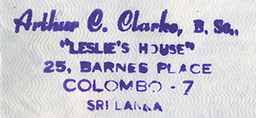On Saturday, March 22, friends and family bid farewell to science-fiction writer Arthur C. Clarke, who died March 19 at his home in Sri Lanka. Best known for the novel and screenplay 2001: A Space Odyssey (1968), Clarke wrote fiction that often juxtaposed themes as audacious as humanity’s destiny with prophetic visions of coming technology. Little wonder that his work influenced generations of scientists and engineers.
“All of us who have been entertained and inspired by Sir Arthur Clarke's writings mourn his passing,” writes David Morrison at NASA’s Ames Research Center in California. Morrison chaired a 1992 NASA workshop that recommended funding for ground-based observatories designed to discover more than 90 percent of all Near-Earth Objects (asteroids and comets) larger than 1 kilometer within 25 years. The project was named the Spaceguard Survey after a similar system described in Clarke’s novel, Rendezvous with Rama (1972). “Clarke graciously endorsed our use of the term,” Morrison says. “He himself supported our efforts to initiate this survey and was pleased to have his name associated with such a worthy endeavor.” This BBC report sums up several of the author’s other predictions.
Edward Rothstein’s appraisal of Clarke’s fiction in the March 20 New York Times gets it right, I think: “Mr. Clarke’s writings were the most biblical, the most prepared to amplify reason with mystical conviction, the most religious in the largest sense of religion: speculating about beginnings and endings, and how we get from one to the other.” Eulogies from filmmaker George Lucas, writer Harlan Ellison, and others give a sense of how far and wide Clarke’s influence runs.
Astronomy Contributing Editor Martin Ratcliffe had the good fortune of meeting Clarke twice. “He was a longtime member of the British Astronomical Association (BAA), and I was a council member of the BAA in the 1980s,” Ratcliffe writes. “Through the BAA's office, I was approached by his brother, Fred, to assist with Arthur's scientific autobiography, Ascent to Orbit (1984). This volume represented all his early scientific papers, which were numerous…. Following completion, I was invited to the press premier of the movie 2010: The Year We Make Contact and met Arthur and his brother. Some months later a signed copy of Ascent to Orbit came to me — one of my most treasured possessions.”
The next time they met, in 1998, was just before a BAA meeting after Clarke had been knighted. “I sat and talked for a few minutes, and then he proudly and quietly showed me the medal he had received an hour earlier from the Queen,” Ratcliffe says.

My odyssey with Clarke’s fiction and non-fiction began at age 13, when I picked up a copy of Childhood’s End (1953). From that moment, I was hooked. Looking back from a distance of nearly 4 decades, Clarke’s prose may have been my strongest influence in deciding to pursue a career that blended both science and writing.
Years later, as I was about to enter my junior year in college, a visit to the National Air and Space Museum in Washington, D. C., inspired me to write the closest thing to a fan letter I’ve ever drafted. In the museum’s gift shop, I noticed half a dozen autographed copies of The Coming of the Space Age (1967), an anthology Clarke had edited. This modest stack was surrounded and outnumbered by Carl Sagan’s latest work and Isaac Asimov’s 200th book. I figured I might get a reply from a busy Clarke if I could make him laugh, and wrote to him how shocked — shocked! — I was at this “heinous crime” of book placement.
To my disbelief, I received an air-mail letter from Sri Lanka several weeks later. It contained a printed sheet of Clarke’s answers to frequently asked questions on which he had written: “Many thanks for the information! Heads will roll….”
For those of you who’d like to see what Clarke was saying about himself in July 1979, I’ve scanned the document. Here’s page 1, and here’s page 2.